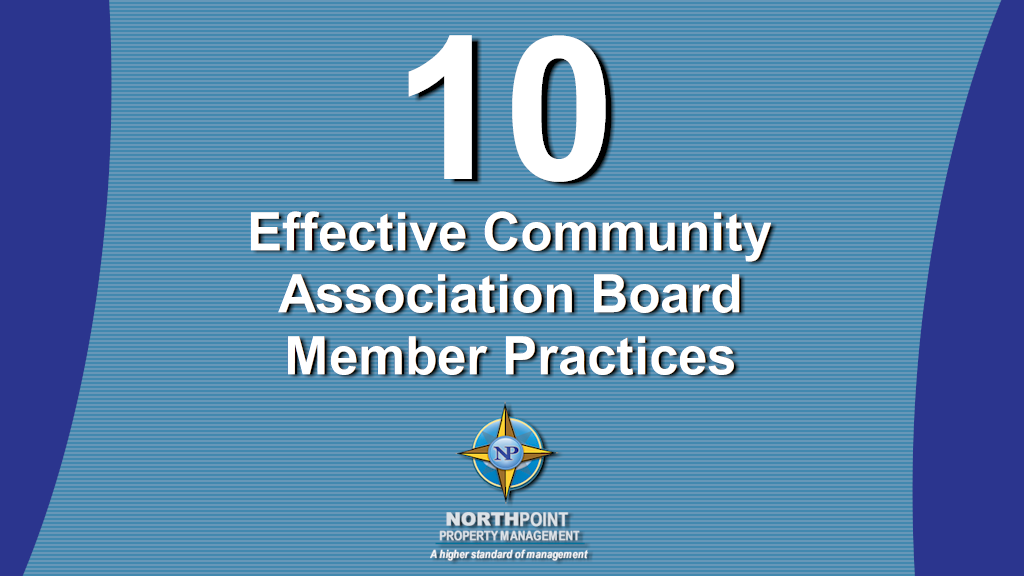The NorthPoint Property Management’s ‘Condo & Homeowner Board Member Handbook’ outlines the TOP TEN factors in becoming a good community association board member:
1. First, become familiar with the operating documents. Very few owners ever look at the declaration or bylaws, let alone the rules. However, in order to be a competent director, this is the route the association must follow and each director should have a “map” of the basic knowledge of what the trip entails. That is not to say that a director should be able to interpret complex issues such as the nuances of insurance coverage, however, each director should be familiar with what the owners get to vote on, the essentials of association maintenance responsibility, open meetings requirements and so on.
2. The declaration generally contains all of the covenants binding the property such as restrictions on use, financial obligations and remedies for owners who fail to follow the rules. Granted, many declarations are written in archaic legalese and often are loaded with developer references, but a careful skimming can lead to an understanding of the basic duties and responsibilities. The gaps can be filled in by an experienced manager and legal counsel. A good board member can identify when the documents seem to be out of date or amended.
3. The bylaws are generally easier to read and spell out the duties and responsibilities of the board and its members. These provisions should be more familiar to each director. Although the declaration has more authority, it is usually written in a more generalized fashion and the bylaws often address issues ignored by the declaration.
4. More important than understanding all of the nuances of the declaration and bylaws, each director should have a working knowledge of the contents of the rules. Since these are approved by the board itself and are subject to change from time to time, this is the document which has the most relevancy to each owner and director.
5. Each owner is responsible for identifying and reporting violations when they see them. Although the members of the board are not policemen, they should be able to recognize violations and respond to questions from the owners. So long as the rules have been reviewed by legal counsel and periodically updated, they should be enforceable and be readily available for any director to review.
6. Directors should have some familiarity with State (and Federal) law. There are many laws applicable to an association that are not discussed in the association’s governing documents. Each board should have a periodic legal checkup or at least information from their lawyer as to important new cases or changes in the law.. Each director of an association should have an updated version of the state’s association statutes.
7. Learn how to read financial statements. Everyone knows an accountant or bookkeeper or if you have an experienced manager, ask them to go over the form so you understand what the numbers mean. Likewise, a budget and a balance sheet.
8. A good way to keep up on changes in the law, efficient techniques and exchanging ideas is to attend some of the many seminars and programs offered throughout the area on selected association topics.
9. Have an orientation and goal setting session for new directors. Many people, not just new boards, have a need for an overview plus a discussion of risks and liabilities for board members. After each election, the new directors, in addition to being advised to read and go to seminars, should also be force-fed the “do’s and don’ts”. Legal counsel, in conjunction with the property manager, should be familiar with the particulars of the property itself as well as the governing documents, so as to provide useful information at the first meeting of a new board.
10. Maintaining the correct temperament is the key to being effective. A good board member does not personalize every issue, is prepared when they come to the meeting, speaks only when they have something relevant to say, listens and does what they promise to do.




